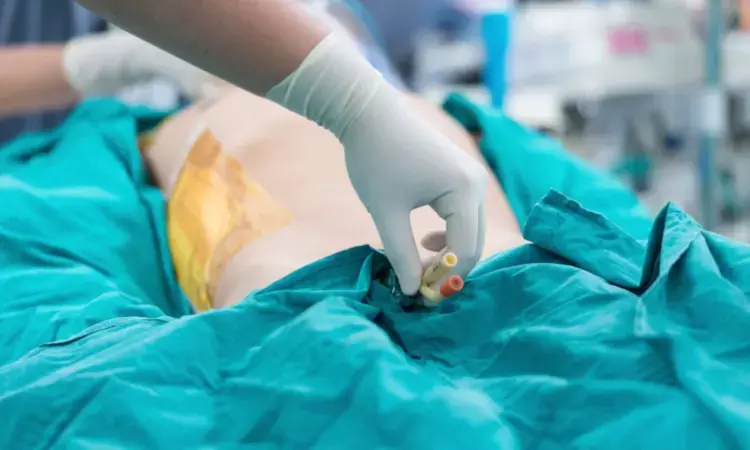- Home
- Medical news & Guidelines
- Anesthesiology
- Cardiology and CTVS
- Critical Care
- Dentistry
- Dermatology
- Diabetes and Endocrinology
- ENT
- Gastroenterology
- Medicine
- Nephrology
- Neurology
- Obstretics-Gynaecology
- Oncology
- Ophthalmology
- Orthopaedics
- Pediatrics-Neonatology
- Psychiatry
- Pulmonology
- Radiology
- Surgery
- Urology
- Laboratory Medicine
- Diet
- Nursing
- Paramedical
- Physiotherapy
- Health news
- Fact Check
- Bone Health Fact Check
- Brain Health Fact Check
- Cancer Related Fact Check
- Child Care Fact Check
- Dental and oral health fact check
- Diabetes and metabolic health fact check
- Diet and Nutrition Fact Check
- Eye and ENT Care Fact Check
- Fitness fact check
- Gut health fact check
- Heart health fact check
- Kidney health fact check
- Medical education fact check
- Men's health fact check
- Respiratory fact check
- Skin and hair care fact check
- Vaccine and Immunization fact check
- Women's health fact check
- AYUSH
- State News
- Andaman and Nicobar Islands
- Andhra Pradesh
- Arunachal Pradesh
- Assam
- Bihar
- Chandigarh
- Chattisgarh
- Dadra and Nagar Haveli
- Daman and Diu
- Delhi
- Goa
- Gujarat
- Haryana
- Himachal Pradesh
- Jammu & Kashmir
- Jharkhand
- Karnataka
- Kerala
- Ladakh
- Lakshadweep
- Madhya Pradesh
- Maharashtra
- Manipur
- Meghalaya
- Mizoram
- Nagaland
- Odisha
- Puducherry
- Punjab
- Rajasthan
- Sikkim
- Tamil Nadu
- Telangana
- Tripura
- Uttar Pradesh
- Uttrakhand
- West Bengal
- Medical Education
- Industry
No impact of bladder perforation on tumour recurrence in TUR of bladder tumors

Egypt: A recent study published in International Urology and Nephrology found a 10% incidence of bladder perforation (BP) in patients who underwent transurethral resection of bladder tumours (TURBT) for non-muscle-invasive bladder cancer (NMIBC). Bladder perforation did not affect the probability of tumour progression, tumour recurrence, or radical cystectomy.
The symptoms were mild and needed only the prolongation of a urethral catheter in 86%. Abdominal drainage was the most common intervention required by the remaining 14%.
Bladder tumours are the most common malignancies of the urothelium, and 75–80% are non-muscle invasive. Trans-urethral resection of bladder tumours is the primary surgical management for NMIBC and is considered one of the most common endourologic procedures. It has been reported to be a reasonably safe procedure, with bladder perforation and bleeding being the most common complications. Bladder perforation, defined as any full-thickness resection of the bladder wall, is a concern; bleeding can be controlled during surgery.
Yasser Osman, Urology and Nephrology Center, Mansoura University, Mansoura, Egypt, and colleagues reported the incidence, predictors, the impact of bladder perforation, and protocol of management in patients who underwent transurethral resection of bladder tumour in a retrospective study.
The study was conducted between 2006 and 2020 on patients who underwent TURBT for NMIBC. Based on their severity and type, bladder perforations were managed. Small BP with no or mild symptoms were controlled with urethral catheter prolongation. Those with significant extraperitoneal extravasations were managed with tube drain (TD) insertion.
Those with significant extraperitoneal extravasations were managed by inserting a tube drain (TD). Abdominal exploration was done for extensive BP and all intraperitoneal extravasations. The study included 1,570 patients (mean age 58 ± 11 years, 86% were males).
The study led to the following findings:
- Bladder perforation was recorded in 10% of the patients.
- The perforation was extraperitoneal in 95%, and in 86%, the perforation was associated with no symptoms, mild symptoms, or mild fluid extravasation that required only prolongation of the urethral catheter.
- The active intervention was required for the 21 remaining patients (14%), with TD being the most frequent management.
- History of previous TURBT and obturator jerk were the only predictors for BP.
"We found a 10% incidence of bladder perforation with TURBT for NMIBC," the researchers wrote. "History of previous bladder resection and obturator jerk was the only independent risk factors for BP occurrence."
They revealed that the symptoms were mild in about 86% of the patients and did not need any active interventions, only prolonging the urethral catheter. For those who needed intervention, abdominal drainage was the most common procedure. There was no effect of bladder perforation on bladder tumour recurrence, progression or the probability of radical cystectomy.
Reference:
Osman, Y., Elawdy, M., Taha, DE. et al. Bladder perforation as a complication of transurethral resection of bladder tumors: the predictors, management, and its impact in a series of 1570 at a tertiary urology institute. Int Urol Nephrol (2023). https://doi.org/10.1007/s11255-023-03638-6
Dr Kamal Kant Kohli-MBBS, DTCD- a chest specialist with more than 30 years of practice and a flair for writing clinical articles, Dr Kamal Kant Kohli joined Medical Dialogues as a Chief Editor of Medical News. Besides writing articles, as an editor, he proofreads and verifies all the medical content published on Medical Dialogues including those coming from journals, studies,medical conferences,guidelines etc. Email: drkohli@medicaldialogues.in. Contact no. 011-43720751


